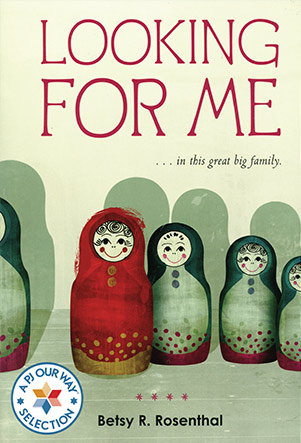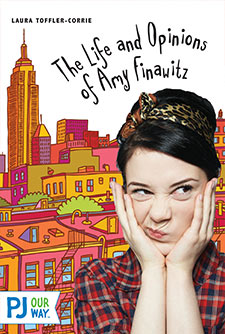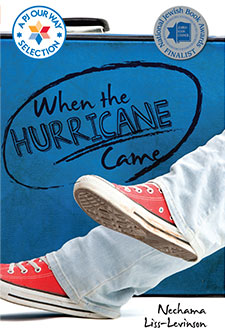Looking for Me
Meet Edith: sixth grader, family babysitter, restaurant waitress, poetry writer, and one of twelve children!! Life is never boring at Edith's house.
Average Rating
( hint: Login to leave a review! )
196 Reviews
Leave Review
What the Book is About
Jewish Content & Values
Positive Role Models
Content Advisory
Talk it Over!
More for You
What the Book is About
This touching book written in simple verse is based on the real life experiences of the author's mother, Edith, who grew up in a large family in Baltimore during the Great Depression. Edith's voice is beautifully authentic, and the simple poems poignantly describe her life through good and bad times.
Jewish Content & Values
- Jewish objects such as mezuzot (the plural of mezuzah: a piece of parchment inscribed with verses from the biblical Book of Deuteronomy that is affixed to a doorframe) and yarmulkes (circular caps traditionally worn by Jewish men) are a part of Edith’s family’s way of life.
- When Edith’s little brother Melvin dies, the family struggles to understand why bad things sometimes happen to good people, which has been a philosophical question Jewish thinkers have wondered about for centuries.
- Edith's family keeps kosher, meaning they eat foods that conform to Jewish dietary laws, and several Jewish "style" foods, such as knishes and gefilte fish, are mentioned.
- Jewish holidays such as Rosh Hashanah, Passover, and Shabbat are celebrated.
Positive Role Models
- Edith deals with hardships and good times in the same straightforward manner. She works hard at her father's diner and excels at school, despite her exhaustion. She takes good care of her siblings and follows her dream to become the first female in her family to go to college.
- Mrs. Connelly is Edith's teacher. She recognizes Edith's potential and urges her to consider going to college.
- Bubby Etta is Edith's grandmother. She works in the family business, keeps a Jewish home, and makes comments that show she has religious faith. When Edith's father says they cannot afford to send Edith to college, Bubby Etta immediately volunteers to help her go.
Content Advisory
Edith experiences some anti-Semitism from other kids, including a boy who says that she killed Jesus and a girl who believes that Edith has horns. Edith’s father sometimes spanks his children, and when Edith’s brother Melvin suddenly dies of bronchitis, the family is left brokenhearted.
Talk it Over!
- Miss Connelly is the first person to tell Edith that she is smart. Can you think of a time that someone told you something that changed how you saw yourself?
More for You
The Torah describes Moses coming down Mt. Sinai with his face “shining” from his meeting with God (Exodus 34:29). The Vulgate (Latin translation of the Bible from the late fourth century) erroneously translates the Hebrew word “karan” (to shine forth) as “keren” (horn). Later, artists (the most notable being Michelangelo) depicted Moses with horns, which contributed to the anti-Semitic idea that Jews have horns.
What the Book is About
What the Book is About
This touching book written in simple verse is based on the real life experiences of the author's mother, Edith, who grew up in a large family in Baltimore during the Great Depression. Edith's voice is beautifully authentic, and the simple poems poignantly describe her life through good and bad times.
Jewish Content & Values
Jewish Content & Values
- Jewish objects such as mezuzot (the plural of mezuzah: a piece of parchment inscribed with verses from the biblical Book of Deuteronomy that is affixed to a doorframe) and yarmulkes (circular caps traditionally worn by Jewish men) are a part of Edith’s family’s way of life.
- When Edith’s little brother Melvin dies, the family struggles to understand why bad things sometimes happen to good people, which has been a philosophical question Jewish thinkers have wondered about for centuries.
- Edith's family keeps kosher, meaning they eat foods that conform to Jewish dietary laws, and several Jewish "style" foods, such as knishes and gefilte fish, are mentioned.
- Jewish holidays such as Rosh Hashanah, Passover, and Shabbat are celebrated.
Positive Role Models
Positive Role Models
- Edith deals with hardships and good times in the same straightforward manner. She works hard at her father's diner and excels at school, despite her exhaustion. She takes good care of her siblings and follows her dream to become the first female in her family to go to college.
- Mrs. Connelly is Edith's teacher. She recognizes Edith's potential and urges her to consider going to college.
- Bubby Etta is Edith's grandmother. She works in the family business, keeps a Jewish home, and makes comments that show she has religious faith. When Edith's father says they cannot afford to send Edith to college, Bubby Etta immediately volunteers to help her go.
Content Advisory
Content Advisory
Edith experiences some anti-Semitism from other kids, including a boy who says that she killed Jesus and a girl who believes that Edith has horns. Edith’s father sometimes spanks his children, and when Edith’s brother Melvin suddenly dies of bronchitis, the family is left brokenhearted.
Talk it Over!
Talk it Over!
- Miss Connelly is the first person to tell Edith that she is smart. Can you think of a time that someone told you something that changed how you saw yourself?
More for You
More for You
The Torah describes Moses coming down Mt. Sinai with his face “shining” from his meeting with God (Exodus 34:29). The Vulgate (Latin translation of the Bible from the late fourth century) erroneously translates the Hebrew word “karan” (to shine forth) as “keren” (horn). Later, artists (the most notable being Michelangelo) depicted Moses with horns, which contributed to the anti-Semitic idea that Jews have horns.



